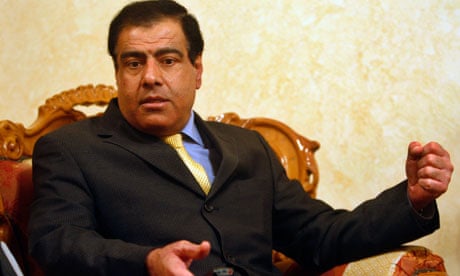Palestinian Doctor Choosing Peace and Dignity over Hate
I Shall Not Hate: A Gaza Doctor’s Journey on the Road to Peace and Human Dignity by Izzeldin Abuelaish – review

“A good chapter in a bad story,” writes Izzeldin Abuelaish of how he tries to find something positive in everything. It’s a good way to describe his life story, an impressive statement of triumph over adversity and optimism in the midst of misfortune. Abuelaish is a gynaecologist and infertility specialist who studied medicine in Cairo and gained further qualifications in London and Havard.
But it was back in Gaza that, on 16 January 2009, at the height of the Israeli assault, three of his young daughters were killed by Israeli shells fired directly into their bedroom. The killings were particularly shocking because they were so deliberate and because Abuelaish was well known to the Israelis. Exceptionally for a Palestinian from Gaza, he had been taken on at two Israeli hospitals, where he made Israeli friends. During the Gaza war he had become a public figure with his eye-witness reports for Israeli TV.
His fame increased when, after his daughters’ deaths, he publicly refused to let their killing provoke him to hatred or revenge. Instead, he preached understanding and co-existence, arguing that these would be more powerful weapons than counter-violence and bloodshed.
He has promoted this viewpoint at numerous public lectures in Europe, America and Asia, and in 2010 was nominated for the Nobel peace prize. He believes that a “silent camp” exists among both communities in the Holy Land, which can come together through dialogue and understanding. Both sides must stop blaming each other and learn to trust. His experiences among Jews and Arabs have shown him how similar they are, and he believes they can learn to co-exist. In this spirit, he had sent three of his daughters – including two who were subsequently killed by Israeli shells – to the Creativity for Peace camp in New Mexico run by Israelis and Palestinians.
Not everyone will share his conclusion that friendly dialogue with the enemy is the best course. A vogue for such dialogue between Jews and Palestinians grew up during the 1990s, after the Oslo Accords. The argument went that it was the leaders on both sides who were at fault, not their people, who just wanted peace. Many were hopeful of this approach to solving the conflict. All these attempts were flawed, however, by the assumption of equivalence between the two sides, and by the failure to acknowledge that understanding and friendship come after the end of conflict, not before. But the individuals engaged in dialogue certainly felt better and made friends. Abuelaish himself has numerous close friendships with Israelis, who have supported him. His extensive travel and wide experience have made him into an exceptional doctor, but a rarity in Gaza, where deprivation has stunted people’s educational and social development. And, sadly, such a valiant attempt to bridge the divide has failed to stop Israel’s colonisation and oppression of the Palestinians.
This is not to belittle Abuelaish’s achievement. In telling his life story, from his birth in Jabalia refugee camp to Israel’s 2008-09 war on Gaza, he gives a vivid and badly needed account of life in Gaza. And such accounts are invaluable, because Palestinians have historically not been good at setting down their experiences through literature, an omission they could ill afford in a western environment antipathetic to their plight.
In the past two decades an increasing number of Palestinian memoirs, novels and plays have appeared, but most emanate from writers living under Israeli occupation on the West Bank, or from exiles outside Palestine. Far fewer works have come out of Gaza itself, where heavy political and economic analyses, legal tracts and humanitarian reports predominate. The result is that it is unusual to find narrative descriptions of everyday life, undistorted by the crude labels now applied to Gazans as terrorists, suicide bombers or Islamic extremists – descriptions that have all but obliterated any concept that Gaza contains real human beings with feelings and aspirations just like other people.
Abuelaish recounts in vivid detail the myriad checkpoints (at least 20) that a Palestinian has to negotiate in order to enter and leave Gaza; the bureaucratic niceties, arbitrary regulations and even emotional moods of Israeli guards at the Erez border that can stop desperately sick patients from passing through. The only other outlet from Gaza is at Rafah, where Egypt has imposed a system of controls almost equally draconian, which impede movement in and out.
This portrait of life under siege and privation, and the methods he and other Gazans use to survive their predicament while preserving a sense of sanity and humanity, will be an eye-opener for many readers.
Ghada Karmi’s Married to Another Man: Israel’s Dilemma in Palestine is published by Pluto Press.